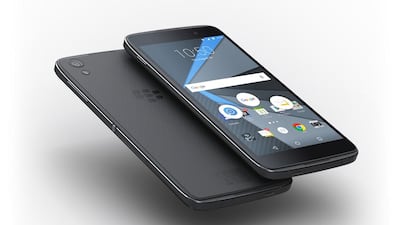After BlackBerry's high-profile Priv smartphone largely failed to make a significant dent among high-end consumers, the Canadian firm has changed tack completely with the launch of the new Dtek 50.
Instead of competing with the iPhones of this world, BlackBerry's latest, retailing for just Dh1,199, hopes to find favour in the furiously competitive mid-priced handset segment against rivals like the Samsung Galaxy J7 and the Honor 5X.
But while such handsets are favourites among consumers, BlackBerry’s latest is designed more for enterprise purchasers. The company claims the Dtek 50 is the world’s most secure Android handset, in a move to appeal to security-conscious IT departments rather than consumers looking for the best screen or camera.
The Dtek 50’s storage is encrypted right out of the box, while its Dtek app notifies you when the handset camera, microphone and location are being accessed. And since the Priv’s launch last December, BlackBerry has been active in providing Android security patches, now available for the Dtek 50.
However, BlackBerry’s “most-secure Android” claim should be taken with a pinch of salt; many of its security features are becoming increasingly standard within the Android operating system itself, while Samsung claims that its Knox mobile enterprise security system is more secure.
The Dtek 50’s reasonable price (especially compared with the Priv), combined with BlackBerry’s security pedigree, may mean that the Dtek 50 will find favour with IT departments.
Beyond such security features, there’s little to recommend the Dtek 50 for the individual consumer looking for an affordable handset. To cut costs, BlackBerry has eschewed an original design, largely replicating the (albeit quite attractive) form factor and features of Alcatel’s Idol 4.
It’s not a bad package, but BlackBerry could have won over consumers by raising the price a little and offering better features.
A little unusually for a device that values security, there’s no fingerprint reader. And while most of the world has now moved on, there are some BlackBerry aficionados who will miss a physical keyboard.
q&a handset era soon to end
John Everington reveals what else BlackBerry’s Dtek 50 has to offer:
Enough about security. How is the Dtek 50 for taking pictures?
Not bad, but not great, as you’d expect around this price point. Like the Idol 4, you get a 13MP camera that does perfectly well in normal conditions but struggles a little in low light settings.
And for watching movies?
The 5.2-inch IPS screen does the job OK, the action scenes of the Suicide Squad playing perfectly adequately, while not offering the wow factor of the Amoled displays of the (slightly more expensive) Idol 4S and OnePlus 3.
So is that it for BlackBerry’s physical keyboards?
Not necessarily. Chief executive John Chen told The National earlier this year that it was working on a new device with a physical keyboard, so watch this space. If you can’t wait that long, the Priv is still available, but you’ll have to pay around Dh2,600 for the privilege.
The Dtek 50 still has BBM and BlackBerry Hub, right?
They do. But these once unique features are also now available across all iOS and Android devices as well.
If that’s the case, who’s buying BlackBerrys these days?
Fewer and fewer people. The company shipped just 400,000 handsets worldwide during the second quarter, a drop of nearly two-thirds compared with last year, according to Gartner. Perhaps the Dtek 50’s low price point will see shipments pick up a bit, but you can’t help the feeling that BlackBerry’s handset days are looking numbered.
jeverington@thenational.ae
Follow The National's Business section on Twitter

